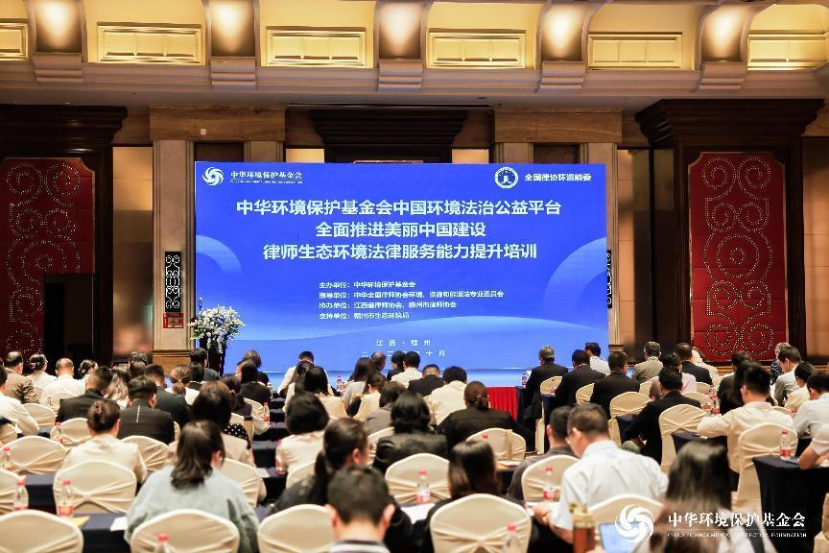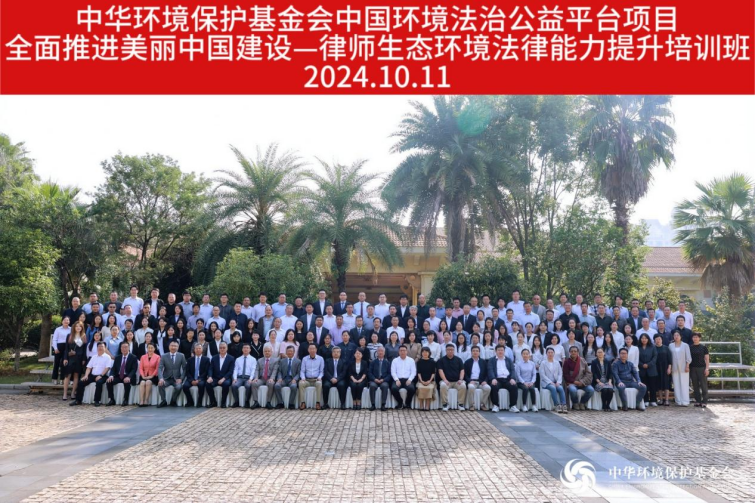Why did this lawyer training meeting attract attention in the field of ecological environment and rule of law?
The China Environmental Protection Foundation's China Environmental Rule of Law Public Welfare Platform "Comprehensively Promoting the Construction of Beautiful China-Training Course on Improving Lawyers 'Ecological Environment Legal Capabilities" was held in Ganzhou City, Jiangxi Province from October 11 to 13.

Yan 'e, deputy director of the Regulations and Standards Department of the Ministry of Ecology and Environment, Liu Chunlong, secretary-general of the China Environmental Protection Foundation, Ma Fei, member of the Party Leadership Group and Deputy Director of the Ganzhou City Ecological Environment Bureau, Zhou Saijun, director of the Environmental, Resources and Energy Law Professional Committee of the All-China Lawyers Association, Liao Zefang, president of the Jiangxi Province Lawyers Association, attended the opening ceremony and delivered a speech.
Yan E said that as an important force in the construction of the rule of law in my country, lawyers play an irreplaceable and important role in safeguarding the legitimate environmental rights and interests of parties, safeguarding the correct implementation of various environmental laws, and promoting green development. This training activity will play a positive role in effectively improving the professional knowledge, ability and professional level of my country's lawyers in the field of environmental rule of law and promoting the construction of environmental rule of law in China.
Liu Chunlong introduced that since the launch of the "China Environmental Rule of Law Public Welfare Platform Project" in 2018, more than 1300 judges, prosecutors, members of environmental protection social organizations, lawyers, and personnel of ecological and environmental administrative departments have been trained. Following the first training activity to improve lawyers 'environmental legal capabilities last year, it will continue to be held this year. The purpose is to help environmental lawyers improve themselves and help environmental protection social organizations further enhance their ability to use legal tools to participate in environmental protection.
"The ecological and environmental legal business has been still a niche business in the legal industry for quite some time. That is, there are few lawyers engaged in it, few lawyers are proficient in the business, the ability of the business to support the survival of lawyers is weak, and the connection between legal services and technical support still needs to be run-in., the business service model is in a development stage, so professional training for environmental lawyers is a long-term task for bar associations at all levels." Zhou Saijun, director of the Environmental, Resource and Energy Law Professional Committee of the All China Lawyers Association, said in his speech.
The reporter noted that the training course content focuses on hot issues such as the compilation of ecological and environmental codes, carbon emissions trading, compensation for ecological and environmental damage, as well as topics such as environmental public interest litigation and environmental legal practice, and invites relevant leaders, experts, scholars, senior lawyers, etc. in the field of ecological and environmental rule of law. Conduct lectures and enrich the training through roundtable discussions and mock courts.
Liu Zhumei, vice president of the Environmental Resources Law Research Society of China Law Society and former president of the Environmental Resources Trial Division of the Supreme People's Court, analyzed the current situation and development trend of environmental resources trials based on many typical cases. She believes that the boundaries of ecological, environmental and resource cases need to be clarified. If the concepts and boundaries are unclear, problems such as specialized agencies being misrepresented and scattered cases will occur.
Focusing on the reform of the ecological and environmental damage compensation system, Yan E introduced the current system construction situation; Yu Fang, chief scientist and researcher of the Environmental Planning Institute of the Ministry of Ecology and Environment, analyzed issues related to the identification and evaluation of ecological and environmental damage from a technical perspective.
"The compilation of the ecological environment code is to systematically integrate, compile, and integrate and sublimate the current ecological environment legal system and norms in a codified manner. The current difficulty lies in compilation and sublimation. For example, what content is not currently available in law but needed in practice? It is necessary to study how to elevate it to law; what content should not be included in the code? Consider carefully." Wang Jin, a professor and doctoral supervisor at Peking University Law School, explained why it is necessary to compile an ecological environment code, how to compile it, and the framework content and institutional innovation.
"The field of carbon emissions trading is an emerging field. There are important legal issues worthy of our attention and participation, and the demand for legal services will also increase." Bie Tao, vice president of the Environmental Resources Law Research Society of China Law Society, chief legal adviser of the Ministry of Ecology and Environment, and former director of the Regulations and Standards Department of the Ministry of Ecology and Environment, explained legal issues related to carbon emissions trading.
The training class also invited a number of representatives of social organizations to share their practical experience in environmental public interest litigation.

This training course is sponsored by the China Environmental Protection Foundation, guided by the Environmental, Resources and Energy Law Professional Committee of the All-China Lawyers Association, co-organized by the Jiangxi Province Lawyers Association and the Ganzhou City Lawyers Association, and supported by the Ganzhou City Ecological Environment Bureau.
More than 160 lawyers from 25 provinces (autonomous regions and municipalities directly under the Central Government) across the country participated in the training on site, with more than 8100 people participating online. The training is of a public welfare nature, and the lawyers participating in the training promise in writing to provide 50 hours of public welfare services to the local environmental protection social organization.







